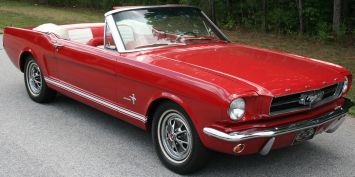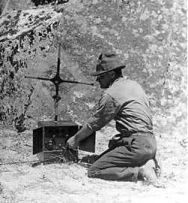|
Personal essay examples
1972 - by David Feela Walking through the city park during Memorial Day weekend, I admired all the hot rods and muscle cars parked on the grass. Every machine, chopped or partially or restored, made me remember my red 1965 Mustang convertible. Just the thought of it makes me close my eyes. Like light from a burned out star, all that flashy chrome still shines from somewhere inside me. All those layers of wax I buffed clean through the hood still make the sweat on my forehead bead up. The top folded back, the radio blaring, a summer moon rolling like a hubcap across the sky. I was eighteen years old. A senior in high school, majoring in myself. My hair was longer than my father liked it, my face was blemished with self-doubt, as if my sense of imperfection constantly wanted out. My mother reminded me not to slouch, then opened the plate glass door to the office where she worked and ushered me through it. "Don't be disappointed if she already sold it" my mother coached. "And don't look excited if she hasn't, at least until I've had a chance to ask how much she wants." I waited in the hall. I stared at my feet until I noticed how the linoleum sent back a ghostly, wavering silhouette of my own body. I studied my reflection, leaning into it. From my mother's point of view, I was slouching. But I swear I caught a glimpse of the future in that shine, like in a crystal ball, I was consulting the powers of fate and fortune, I was tuned in to the pulse and strobe of fluorescent lighting that stretched across the ceiling. I was coming down like a pilot toward a landing strip, wings balanced, the ground seeming to rise, the runway crew scrambling to welcome me with wild arms. Nobody owns the road but put a teenager in the driver's seat and he thinks he does. I was, in the flick of an ignition switch, a devout convert to the temple of the industrial world. I would kneel at its altar all summer, anointed to the elbows with grease from a hundred graveyard shifts in a downtown Minneapolis machine shop, where my paycheck was a cache of power: horsepower. When I pulled out of my parents' driveway, I was in charge; nobody told me what I should or should not do, what to think, when to sit, speak, or in what particular tone of voice I was or was not supposed to address them. With the top down, I listened to the harmony of the spheres transmitted through my cylinders. I stepped on the accelerator and made my 289 cubic inches howl back at the moon. That was, as they say, then. Here is closer to now: my Mustang is gone, traded for a year of college tuition. I don't even remember the face that came to pay for the car or pick it up. Man or woman, I don't really know. Human-at least human-I can assure you. I lived in a basement with three roommates and I was authentically on my own for the first time in my life, flagrantly disconnected from my family and the college's dormitory system, a rebel without a car. Every responsibility in the world came down on me but I couldn't see them coming: rent, the telephone bill (with long distance charges by a roommate who moved away), groceries, even dog food despite the reality that the dog I fed didn't belong to me. Here is now again, almost free of nostalgia: I'm still in charge, nobody except my boss threatening me with termination, that is, unless middle age and cholesterol can be counted as bosses. I'm an English teacher in a small high school two thousand miles from my hometown, happily married, with IRAs, driving a Pontiac sedan. My Mustang would be priceless if I still owned it. I have no children, my mother and father gone down the road ahead of me. When I first buckled up in the driver's seat of that Mustang, I thought now was forever. One full tank of gas would have been enough to convince me I had eternal life. Apparently life doesn't get that kind of mileage. You inherit it from someone else, from your parents for instance, and they, in turn, from their parents. It increases in value the longer you have it until near the end you would give anything to have it back, as they say in the blue book, to appreciate. No doubt I'll go on thinking about my red 1965 Mustang convertible now that the steel has been dissolved and recast as memory and the memory welded to these words. I'll retire after thirty years and wonder if I ever truly was free. It may be that a post-industrial boy's rite of passage is acted out through his machine. Independence is a spark leaping across a universe that ignites us into being. And here I keep polishing a little spot in time, imagining it forever winking back at me. |
Cashing in the Cache - Treasure Hunting in the Four Corners by David Feela
“Hey, look at this” he whispered. She hurried over and pressed against him as she tried to see what had gotten him so excited. They’d been rooting around on the shaded hillside through the bushes, rocks, and weeds next to the middle school, but they hadn’t discovered what they knew was hidden there. They found empty liquor bottles, cigarette butts, thorns, fast food trash, and the faded remains of somebody’s homework from math class. Then she saw what he’d been pointing at: A condom, still in its package. “Oh grow up and get a life,” she exclaimed, and when she pushed against him this time he lost his balance and sprawled in the dirt. Typical antics for 14 year olds it would seem, but the couple I’m writing about was over 50. I know, because I’m still picking the stickers out of my shorts. I won’t identify the woman – she still drinks coffee with me in public – but I will say we eventually found what we’d been looking for: A plastic container, with a screw-on lid, wrapped in camo tape, cleverly hidden beneath a stack of stones on the hillside. We’d almost given up looking, but according to our information 210 other people had managed to find this canister since it was first hidden in 2005. We had her self-respect to maintain, even if mine had already been compromised. What we found inside the container was standard loot for a geocache. Sometimes called a Stash hunt, geocaching refers to the practice of using location coordinates with a Global Positioning System (GPS) to discover what amounts to buried treasure. Actually, it’s not literally buried but cleverly concealed. And it’s not bonafide treasure either, but I’m hoping one day to be the first geocacher to appear after a Texas billionaire on a lark leaves the deed to one of his oil wells. If it doesn’t happen in my lifetime, at least the hunt will have been exciting. A cache (pronounced so it sounds like cash, not catch) gets tucked away in some nook or cranny where people like us devote a few good hours of hiking and orienteering to discovering it. Caches can be rediscovered by anyone as long as its integrity hasn’t been compromised. Hundreds of caches have been hidden in the Four Corners region. In fact, caches can be tracked down all over the earth. Equipped only with your locality’s zipcode, you can see what treasure has been buried near your home by logging on to a geocaching internet site at <www.geocaching.com>. Of course, you’ll need a GPS unit to find it, unless you have, like a compass, an uncanny sense of direction. The cache we eventually found on the hillside in Flagstaff contained a small logbook where I noted the date of our arrival, and a handful of objects left by other cachers, including a carabiner key chain, a hair barrette, a plastic dinosaur, somebody’s pocket change, a worn dollar bill, one necklace, two pens, a couple business cards, and a pair of sunglasses. I kept the sunglasses, because beyond the trees the sky was bright and besides, they were pretty nice shades; I left a handmade ceramic coin with the image of a face etched onto it – something designed in an art studio – to be spent on the next finder’s imagination. This may sound like pirating but I did nothing wrong; I followed the rules for all geocaches: Take something from the cache, Leave something in the cache, Write about it in the logbook. The system works on an honor code and judging from the number of caches we’ve found intact, honor is more common than previously suspected. In two months we’ve visited over 15 caches. Some are easy to track down, just off the path, while others are more difficult because the host has left less information to help. One clue that finds its way into any listing is a set of coordinates. My home, for instance, can be found by orienteering along N 35 degrees, 12.276 feet and W 111 degrees, 39.169 feet. These numbers represent the intersection where I live, not a physical crossing of paved streets but a theoretical crossing of longitude and latitude. I prefer it when intersections stay hypothetical – they’re less dangerous to cross. The coordinates are made possible by 24 Federal satellites designed for military use circling the earth, and it costs me nothing to access their signals except the price of my GPS, plus billions of tax dollars pulled from our pockets to get these satellites built and into orbit. A basic $100 unit can get me within 20 feet of any geocache, as long as trees or roofs aren’t blocking the satellite signals and interfering with my GPS’s ability to triangulate my position. I imagine the military can do better than 20 feet but I try to feel compassion for what they’re trying to uncover. Geocaching has taken us to explore wilderness areas within the San Juan, Uncompahgre, and Coconino National Forests. We’ve found local caches in and around Cortez, Durango, Flagstaff, Moab, and Telluride, in places dozens of people pass by each day without noticing. You see, we are the couple who appear to have lost our marbles, stumbling and stopping to stare into our hands, getting down on all fours to grope beneath bushes, rocks, and stumps. If you see us it’s best to walk by. Offering assistance only compounds the mystery. “No thanks,” one of us will mumble, “it’s our bearings we’ve lost.” |


